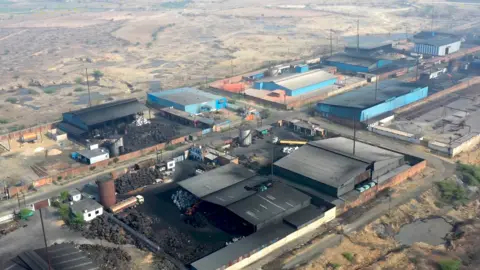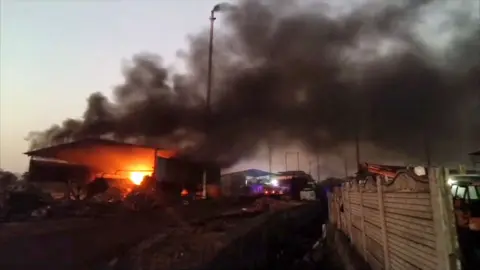Millions of UK Tires Meant for Recycling Sent to Furnaces in India
A BBC investigation reveals that millions of UK tyres meant for responsible recycling are being shipped to India, where they are burned in cement kilns, harming air quality and undermining circular economy efforts.
Millions of tires being sent from the UK to India for recycling are being “cooked” in makeshift furnaces, causing serious health problems and substantial environmental damage, the BBC has discovered.
The majority of the UK’s exported waste tires are sold into the Indian black market, and this is well known within the industry, BBC File on 4 Investigates has been told.
“I don’t imagine there’s anyone in the industry who doesn’t know it’s happening,” says Elliot Mason, owner of one of the largest tire recycling plants in the UK.
Campaigners and many in the industry, including the Tyre Recovery Association (TRA), argue that the government is aware the UK is one of the worst offenders in exporting waste tires for this purpose.
The Department for Environment, Food, and Rural Affairs (Defra) has informed us that it has strict controls in place for exporting waste tires, including the possibility of unlimited fines and imprisonment.
When drivers have their tires changed, garages charge a small recycling fee - it can vary, but it usually costs around £3-6 for each end-of-life tire.
This should guarantee that they are recycled - either in the UK or abroad - at facilities like Elliot Mason’s Rubber World, in Rushden, Northampton.
His facility has repurposed tires into tiny rubber crumbs since 1996. Rubber crumb is often used as flooring for equestrian centres and children’s playgrounds.
The UK ends up with approximately 50 million waste tires (nearly 700,000 tonnes) in need of recycling every year, and around half of those are exported to India, according to official figures, where they are intended to ultimately end up in recycling plants.
Before tyres leave the UK, they are compressed into giant rubber cubes known as “bales”.
“The pretence is that baled tyres are being sent to India and then shredded and granulated in a factory very similar to ours,” explains Mr Mason.
However, some 70% of tires imported by India from the UK and the rest of the world end up in makeshift industrial plants, where they are subjected to what amounts to an extreme form of cooking, the TRA estimates.
In an oxygen-free environment, at temperatures of approximately 500 °C, a process known as pyrolysis occurs. Steel and small amounts of oil are extracted, along with carbon black—a powder or pellet that can be utilized in various industries.
The pyrolysis plants, often located in rural backwaters, are akin to homemade pressure cookers and produce hazardous gases and chemicals.
UK tyres are ending up in these Indian pyrolysis plants, despite legitimate official paperwork stating they are headed for legal Indian recycling centres.
Together with SourceMaterial, a non-profit journalism group, we wanted to follow the long journey that UK tyres undergo. Trackers were hidden in shipments of tires to India by an industry insider.
The shipments embarked on an eight-week journey and eventually arrived at an Indian port before being driven 800 miles cross-country to a cluster of soot-covered compounds beside a small village.
Drone footage, taken in India and shared with the BBC, showed the tires reaching a compound - where thousands were waiting to be thrown into considerable furnaces to undergo pyrolysis.
BBC File on 4 Investigates approached one of the companies operating in the compound. It confirmed that it was processing some imported tires but stated that what it was doing was neither dangerous nor illegal.
There are up to 2,000 pyrolysis plants in India, an environmental lawyer in India told the BBC. The authorities license some, but around half are unlicensed and therefore illegal, he said.
At a different cluster of makeshift plants in Wada, just outside Mumbai, a team from BBC Indian Languages saw soot, dying vegetation, and polluted waterways around the sites. Villagers complained of persistent coughs and eye problems.
“We want these companies moved from our village,” one witness told us, “otherwise we will not be able to breathe freely.”
Scientists at Imperial College London told the BBC that plant workers continually exposed to the atmospheric pollutants produced by pyrolysis were at risk of respiratory, cardiovascular, and neurological diseases and certain types of cancer.

At the site the BBC visited in Wada, two women and two children were killed in January when there was an explosion at one of the plants. It had been processing European-sourced tires.
The BBC approached the owners of the plant where the explosion happened, but they haven’t responded.
Following the blast, a public meeting was held, and the minister for the Wada district promised that the local government would take action. The authorities have since shut down seven pyrolysis plants.
The Indian government has also been approached for comment.

Many UK businesses will bale tires and send them to India because it is more profitable, and investing in shredding machinery is expensive, according to Mr Mason.
However, he says he isn’t prepared to do this himself because he has a duty of care to ensure his company’s waste is sent to the right place - and it is complicated to track where tire bales end up.
Bigger businesses, like Rubber World, have tightly regulated environmental permits and are inspected regularly. However, smaller operators can apply for an exemption and trade and export lawfully more easily.
This is known as a T8 exemption, which allows these businesses to store and process up to 40 tonnes of car tires per week.
However, many traders told the BBC that they exported volumes of tires above the permitted limit, suggesting that they had exceeded their allowed tire exports.
‘I’m not a health minister.’
The BBC was tipped off about several of these companies and teamed up with an industry insider who posed as a broker with a contract to sell waste tires to India.
Four of the six dealers we contacted reported processing large numbers of waste tires.
One told us he had exported 10 shipping containers that week, which contained about 250 tonnes of tires, more than five times his permitted limit.
Another dealer initially showed us paperwork suggesting that his tires were baled and sent to India for recycling, which would have been permitted; however, he later admitted that he knew they were going to India for pyrolysis. The Indian government has made it illegal to use imported tires for pyrolysis.
Numerous companies do it… 90% of English people are involved in this business,” he told us, adding that he cannot control what happens when tires arrive in India.
When we asked if he had concerns about the health of people living and working near the pyrolysis plants, he responded, “These issues are international.” Brother, we can’t do anything… I’m not a health minister.”
 Georgia Elliott-Smith
Georgia Elliott-Smith
Defra told the BBC that the UK government is considering reforms on waste exemptions.
“This government is committed to transitioning to a circular economy, moving to a future where we keep our resources in use for longer while protecting our natural environment,” a spokesperson said.
In 2021, Australia banned the export of baled tyres after auditors investigated where they were ending up. Lina Goodman, the CEO of Tyre Stewardship Australia, told the BBC that “100% of the material was not going to the destinations listed on the paperwork.”
Fighting Dirty founder Georgia Elliott-Smith says sending tires from the UK to India for pyrolysis is a “massive, unrecognised problem” that the UK government should address. She wants tires redefined as “hazardous waste”.
Additional reporting by Janhavee Moole and Shahid Shaikh, BBC Marathi
To view the original BBC article, follow the link » GO.
From Recycling to Indian Pyrolysis — The System Is Broken
Millions of tires are being shipped from the UK to India under the guise of recycling, only to be burned or poorly pyrolyzed for cheap fuel. This is not circularity. It’s environmental injustice.
Klean Industries Delivers Real Circular Solutions:
✅ Advanced tire pyrolysis facilities operating globally
✅ Recovered carbon black, oil & gas with ISCC-certified traceability
✅ No illegal exports, just real ESG outcomes backed by tech
✅ KleanLoop™ platform to verify every tire’s end-of-life journey
You can return to the main Market News page, or press the Back button on your browser.

